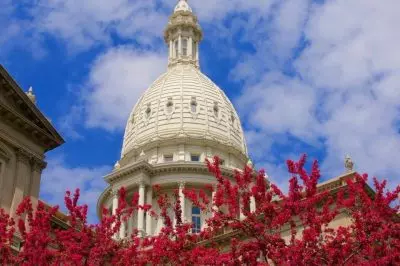 Yesterday, the Michigan House of Representatives approved the legalization of sports betting, both retail and online, as well as gambling on daily fantasy sports (DFS), even though state lawmakers have not managed to reach an agreement with Michigan Governor Gretchen Whitmer.
Yesterday, the Michigan House of Representatives approved the legalization of sports betting, both retail and online, as well as gambling on daily fantasy sports (DFS), even though state lawmakers have not managed to reach an agreement with Michigan Governor Gretchen Whitmer.
The House of Representatives passed the main bill under the new form of gambling will become officially legal in Michigan with bipartisan support and 63 to 45 votes.
Under the bill, sports betting operators would be made to pay an 8.75% tax. Also, an additional 3.25% tax for Detroit casinos that will offer the new form of gambling is to be implemented. As far as online sports betting is concerned, the tax for offering the service would start at 4% and could increase to 23%. According to the main sponsor of the sports betting bills, Representative Brandt Iden, the tax revenue which is expected to be generated by the new form of gambling for state coffers amounts to up to $30 million, while the overall worth of the betting market is projected to be about $225 million.
Local lawmakers who have backed the addition of sports betting to the state’s gambling sector have insisted that some of Michigan’s neighboring states in the Midwest have already made the new form of gambling legal and have already been reaping the benefits. According to them, the addition of sports betting would provide the state with another revenue source so that the profits are redirected to important public services for local communities and various educational programs.
Michigan Governor Insists That Proposed Sports Betting Tax Rate Is Too Low
 Governor Gretchen Whitmer, however, has been claiming that the proposed sports betting tax is not enough. A spokeswoman of hers, Tiffany Brown, commented that the Governor’s office still has revenue concerns regarding the possible negative impact which the sports betting bill could have on the School Air Fund.
Governor Gretchen Whitmer, however, has been claiming that the proposed sports betting tax is not enough. A spokeswoman of hers, Tiffany Brown, commented that the Governor’s office still has revenue concerns regarding the possible negative impact which the sports betting bill could have on the School Air Fund.
Ms. Whitmer has also shared her concern that the increased number of gambling options would result in a decreasing amount of money contributed to the state lottery which is used to support the School Aid Fund. She believed that a 12% tax rate on both sports betting and daily fantasy sports would be much more appropriate. The Governor has also proposed online betting taxes in the range from 2% to 19%, depending on the games and the amount which players place as online bets.
In comparison, the tax rates which have been imposed on sports betting services in other states vary from 6.75% in the state of Nevada to 51% in the state of Rhode Island. The proposed tax rate of 8.75% for the sports betting services in Michigan would the second-lowest rate behind the one set in Nevada. The proposed tax rate is also lower than the ones imposed in other nearby states.